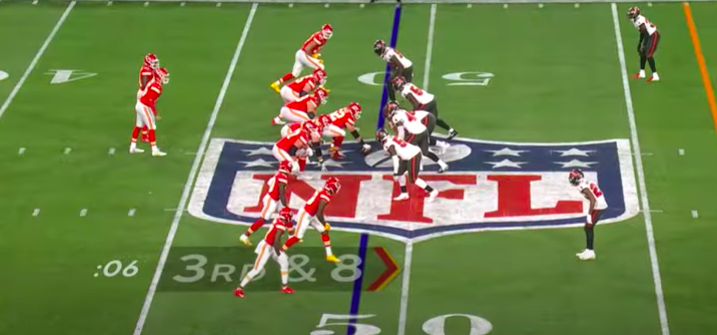Students watching the Super Bowl on Sunday decided it was an occasion worth some risk. The Tampa Bay Buccaneers defeated the Kansas City Chiefs 31-9, a showdown between legendary 43-year-old quarterback Tom Brady of the Buccaneers and young star quarterback Patrick Mahomes of the Chiefs. In the end, The Kid gave the GOAT his seventh Super Bowl win.
Daniel Zika, a sophomore journalism major, said he bets on sports consistently but makes sure not to go overboard. For the Super Bowl, he placed numerous prop bets — in other words, bets on certain players’ performance. He didn’t put any money on the score or who would win.
“I couldn’t get myself to bet for Tom Brady, but I couldn’t get myself to bet against Tom Brady either,” Zika said. “It was just a losing cause, as clearly it was.”
He said he also put money on the coin toss, “just for kicks,” and it ended up paying off. Overall, he put about $60 into the big game and in the end, he was down $10. Zika had multiple prop bets on Mahomes, which were his biggest losses. He placed his bets online through a bookkeeper he knows, though he said he’s waiting for Maryland to set up a solid legal sports betting system. Maryland legalized sports betting during the November 2020 elections and that could start this summer, according to the Associated Press.
[The Weeknd stuns in cryptic Super Bowl halftime show]
“It’s something that you have to learn to control because it’s super easy to get lost in it. I feel like I’ve gotten a pretty good grip on when I want to bet and what games I choose to bet on,” Zika said. “The second you open yourself up to sports betting, you could throw money on anything. There’s a reason why Vegas is Vegas.”
He places bets on sports to make watching games more fun, though he’s wary of the risks. He also said he usually only bets on teams he knows well, like University of Maryland sports teams.
“Even when they’re shitty, they sometimes pull a game or two out, and the odds of that happening are very low so if you end up betting on them, you actually end up making a little bit of money,” Zika said with a laugh.
Gautam Rao, a sophomore computer science major, wagered more money than usual on Sunday’s big game. He put $40 on the Buccaneers to win and made several prop bets, including that Brady would get at least one rushing yard; he didn’t.
In fact, Brady made a joke about betting on his own rushing yards. Still, Rao said that he walked away with a $70 profit. On a normal game, he said he bets in units of $20 and doesn’t go much higher than that.
“Too much risk,” he said.
[This Valentine’s Day, surprise your sweetheart with homemade chocolates]
He also said he does informal future bets with his friends, though less often. A future bet is when a gambler puts money on something that is so far away it’s difficult to predict, like betting on which teams will be in the NBA finals before the season has started.
“You have a stake in the outcome of the game, which is the main fun aspect of it. Now that I’ve started sports betting, it’s hard to imagine watching sports without having some money on it,” Rao said.
Ethan Schaffer, a junior computer science major, only bets informally among friends. For the Super Bowl, he said he put $10 on the national anthem taking longer than two minutes, which it did. Then he put another $10 on the coin toss and lost, breaking even. Once he turns 21, he would be open to doing more sports betting, but only with small sums of money.
“I think it’s interesting because as a computer science major, sports betting uses a lot of data but also a little bit of intuition,” Schaffer said. “Trying to put all that together towards sports, which is something I’m interested in, can be a lot of fun and a really interesting thing to do.”
Whether they broke even, earned a profit or went in the hole, at the end of the day, gambling is like any game: It’s about fun. Except in this one, Zika said, “you’re going to lose more money than you win if you’re not smart.”



